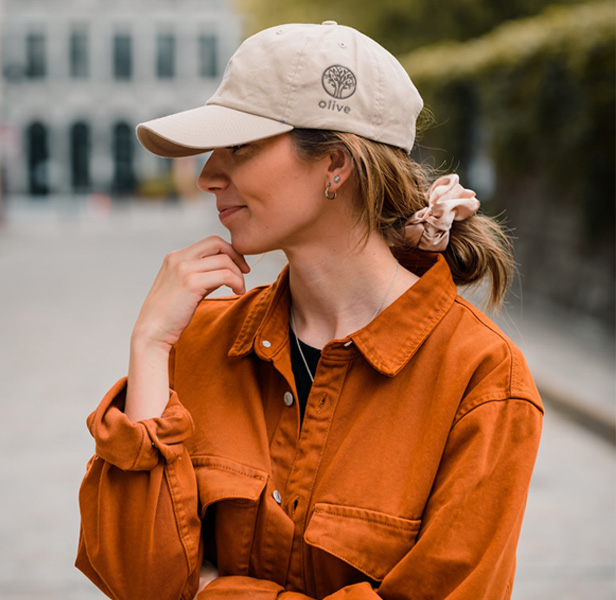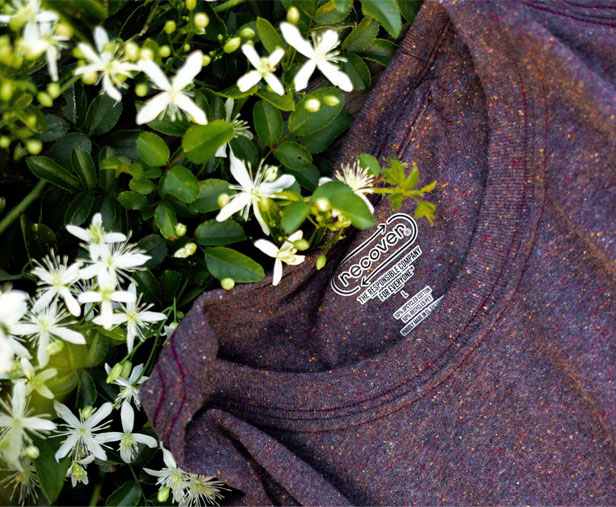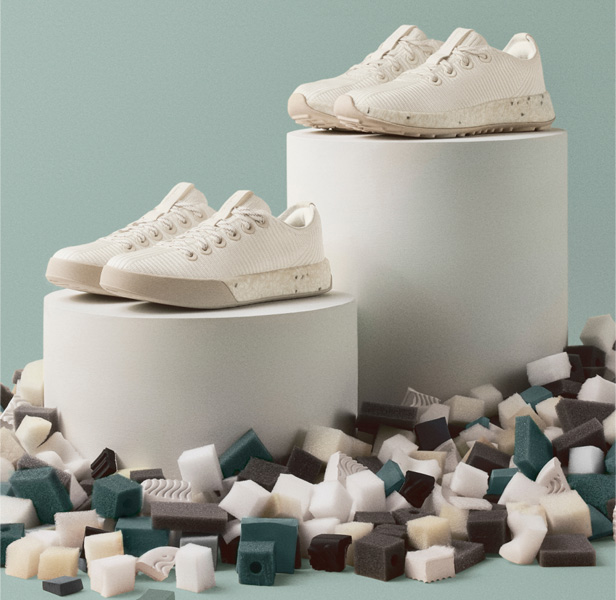Sustainability CANADIAN NEWS September 10, 2025
Sustainability Roundup: Biodegradable Hat Brims & Recycled Footwear
Brands in promo and beyond are pushing innovations in circularity.
Key Takeaways
• Canadian headwear supplier Whelk, which donates 1% of profits to ocean cleanup, has developed hats with biodegradable plastic brims.
• Recover Brands, part of NG Labs (asi/41325), launched Recover L.A.B., a new initiative to test recycled-fiber innovations and release limited-run products in new colorways.
• Allbirds introduced Remix footwear styles made with reclaimed-foam midsoles from Blumaka and textile-to-textile recycled fibers from Circ, reducing water use and carbon emissions compared to traditional production.
A Canadian headwear brand is making waves in promo with its innovative approach to hat manufacturing and materials. Whelk launched in 2019 as a way to raise funds for ocean-cleaning efforts. Founder Justin Bastarache and two friends would embroider caps with animals and other aquatic themes, donating a portion of sales to environmental nonprofits devoted to getting plastic waste out of waterways.

Sustainable headwear supplier Whelk offers caps that feature a biodegradable plastic brim.
Soon enough, however, Bastarache learned his efforts were counterintuitive. “The fashion industry is just terrible for the planet,” he tells ASI Media. “Inside every hat is a piece of plastic. … That’s when we realized there was an opportunity to make headwear more sustainable.”
After three years of research and development, Bastarache landed on Blutech, an additive that makes Whelk’s plastic brims biodegrade naturally in landfills. “You can still put it in your washing machine, you can wear it in the rain, you can leave it in your basement for 20 years, nothing will happen,” Bastarache says. “It requires a really high concentration of bacteria for the process to begin.”
Though the firm started out in retail, the bulk of Whelk’s business (about 85%) comes from promo. “We want to be one of those brands that promotes the new face of cleaner promo and thoughtful, purposeful merch,” Bastarache says.
As demand for Whelk’s products has grown, the company has been working to open its own manufacturing facility in Quebec, where it will make certified organic cotton hats.
A 1% for the Planet member, Whelk donates 1% of its profits to ocean cleanup. The supplier is also devoted to transparency: A section of its website called “F*ck Greenwashing” shares the good and bad aspects of its products and manufacturing processes. “We want to be as transparent as possible,” Bastarache says. “We like to say were sustainable, but still have stuff we need to improve, and I’ve made sure that stuff is public.”
Recover Brands Launches New Recycled Fabric Initiative

Recover Brands, part of NG Labs (asi/41325), is experimenting with new colorways for recycled fibers through its new initiative Recover L.A.B.
Recover Brands, part of NG Labs (asi/41325), has launched a new initiative, dubbed Recover L.A.B. Short for “Living and Breathing,” L.A.B. is meant to be a testing ground and innovation driver to help the apparel supplier continue to advance its recycled-fiber manufacturing capabilities by developing new recycled-cotton materials and releasing new limited-run products.
As with any Recover product, every L.A.B. piece is crafted from 100% recycled materials in the company’s hyperlocal supply chain. But L.A.B. takes its sustainability vision further by using new mixes of fibers and colors of textile waste as a source of creative inspiration.
Among the first releases from Recover L.A.B. are T-shirts in a new colorway inspired by the Milky Way galaxy. Made from a 50/50 blend of recycled cotton and recycled polyester, the shirt features a black base with a heathering of purple, red, yellow, white and blue – giving it a space-dye effect without the use of dyes.
Allbirds Uses Recycled Foam in Remix Footwear

Remix styles from Allbirds are made with recycled foam and textile-to-textile recycled materials derived from polycotton waste.
Allbirds’ new Remix footwear styles give second life to manufacturing waste by transforming blended textile waste and foam scraps into brand-new shoes. The innovation is thanks to a partnership with Blumaka, which converts recycled foam into footwear, and Circ, an innovator in textile-to-textile recycling.
“To us, ‘better things in a better way’ means that we’re not tied to one technology or one method of making – we have a limitless curiosity that inspires us to explore unexpected approaches,” said Adrian Nyman, chief design officer at Allbirds. “Remix is the next step in our innovation journey, delivering on sustainable design that enhances both look and feel.”
With billions of shoes produced annually, the footwear industry generates a staggering amount of manufacturing waste, including trimmings, shavings and dust from the cutting and shaping processes. Allbirds notes that in midsole foam alone, the industry produces 344,000 tons of waste a year – enough material to craft 2.5 billion midsoles – and much of this high-quality foam is unused and discarded. The materials, which are often nonbiodegradable and difficult to recycle, are then routed to landfills where they take decades to decompose and emit harmful chemicals like methane.
Allbirds’ new Remix styles incorporate Blumaka midsoles crafted of reclaimed-foam scraps from athletic footwear manufacturing; these are ground and molded into a high-performance, recycled-foam blend. The process uses 99% less water and emits 65% fewer carbon emissions than traditional foam production.
“Allbirds is demonstrating that the world doesn’t need more foam – it needs smarter use of existing resources,” said Stuart Jenkins, CEO of Blumaka. “We don’t recycle trash – we reclaim the most advanced foam ever made and improve upon it.”
According to Allbirds, the Remix styles are the world’s first to use textile-to-textile recycled materials derived from polycotton waste, using Circ’s proprietary hydrothermal recycling process that separates and recovers cotton and polyester fibers from blended garments.
“By using Circ Filament Lyocell from recycled textile waste as part of the upper for the Remix, we’re showing that circular materials don’t require compromise; they can look better, feel better and do better for the planet,” said Peter Majeranowski, CEO of Circ. “This is the future of fashion, and we’re proud to help lead the way.”

Promo for the Planet is your destination for the latest news, biggest trends and best ideas to help build a more sustainable and socially-responsible industry.
